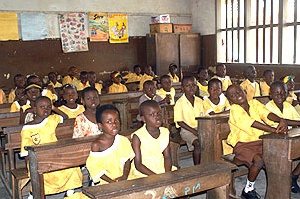Regional News of Wednesday, 13 February 2013
Source: todaygh
Shift system still exist in Accra schools
Investigations conducted by Today newspaper have unraveled the continual existence of the shift system in public basic schools in some parts of the capital despite the insistence of the ruling administration that it has expanded educational facilities in the country.
Some public schools in the Ga West District, including Mayera Primary,OdumasiAmanfro D/A Primary Schools, Salvation Army Basic School in Tabora and Abeka Motorway Primary Schoolin Accrastill practice the shift system as a means of containing the increasing numbers of pupils that are coming in.
At these schools, the paper’s investigations revealed, pupils are grouped into morning and afternoon sessions as a means of controlling the numbers and enhancing teaching and learning.
Pupils that attend the first session commence classes at 8:30 A.M., and close at 12:30 P.M.,to make way for the second batch of pupils who end classes at 4:00 P.M.
The existence of the shift system in Ga West contradicts the much touted claim by the Mahama-led administration that it was able to expand educational infrastructure to help eradicate the system in its first term.
The paper learnt that the shift system is re-emerging in Ga West because a lot of parents that live in the new suburbs are moving their wards from private schools, which are now charging exorbitant fees.
And the lack of additional classroom blocks to accommodate the increasing number of pupils means the public schools have to revert to the shift system, since they cannot turn the pupils away.
Indeed, the few classroom blocks in these schools, captured by Today’s cameras, are in a dilapidated state and so school children and teachers alike must always abandon their classrooms anytime the weather shows signs of pending rain.
A lower primary teacher of the Mayera Primary School told this reporter that officers from the education office in Amasaman are aware of the poor state of infrastructure, but came to the school and grouped the pupils into two sessions as a means of dealing with the large numbers on register.
Though teachers are not happy with the situation, which lays too much work on them, they were tight-lipped on the matter for fear of victimization by the “powers that be,” since the shift system is the subject of party-political propaganda.
Some teachers, who spoke to this paper on condition of anonymity, complained bitterly about the lack of teaching aids, which, in addition to poor infrastructure, is gradually driving most of their colleagues out of the district and causing a decline in teacher posting to the area.
“We have to buy our own text books and use them whiles teaching, because the education office is providing none. We also have to copy notes on this poor pieces called blackboards for the numerous students…,” a teacher complained.
He therefore called on government to come to their aid “before we all exit the area to seek greener pastures elsewhere.”
A lot of parents are unhappy with the shift system borne out of severe necessity, because, according to them, it is failing their children.
“It is having a psychological effect on our kids…, but we simply can’t do anything about it except to appeal to government to come to our aid,” says a parent, Ayi Aryeetey.











